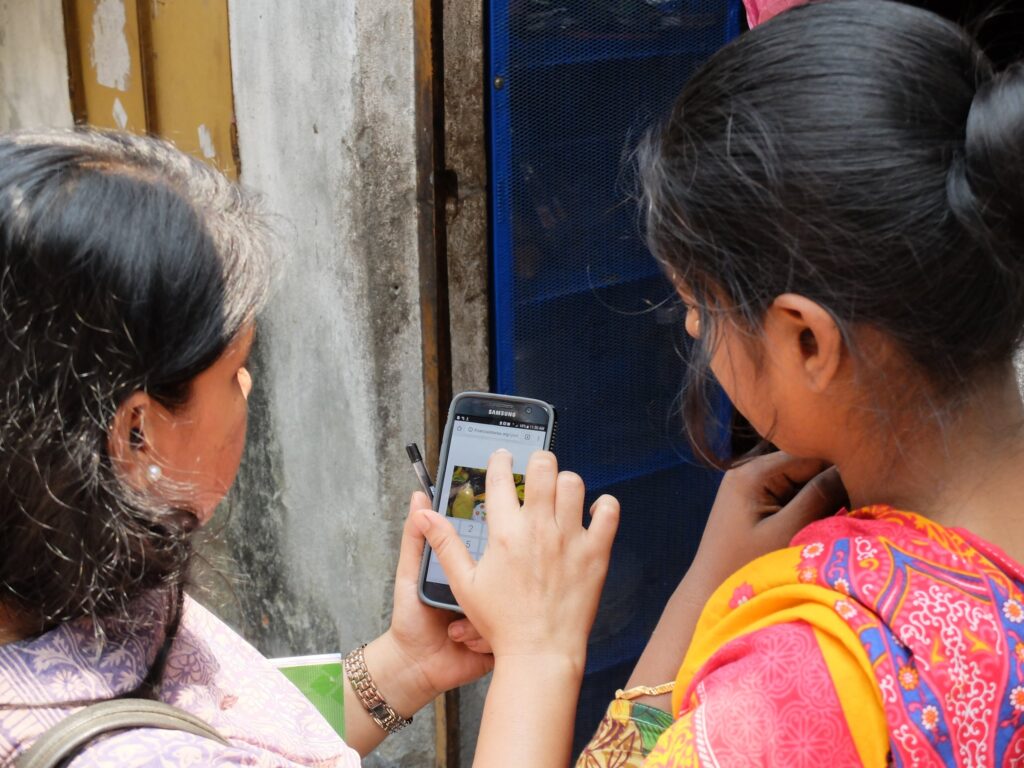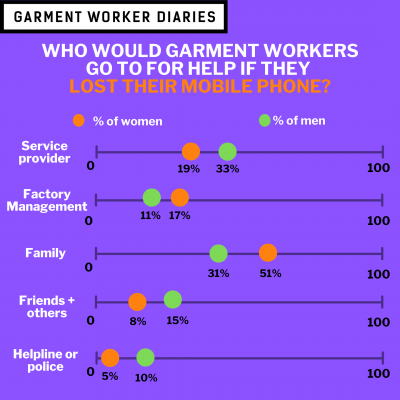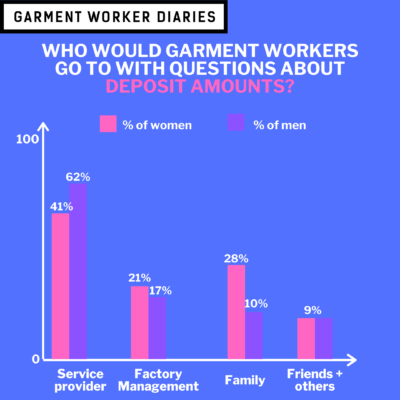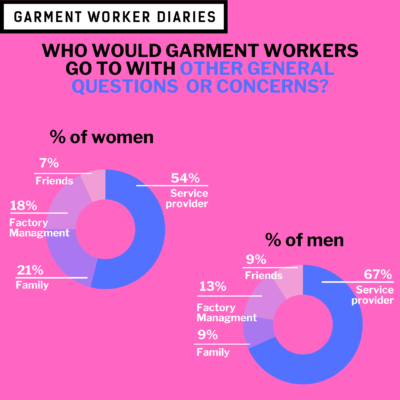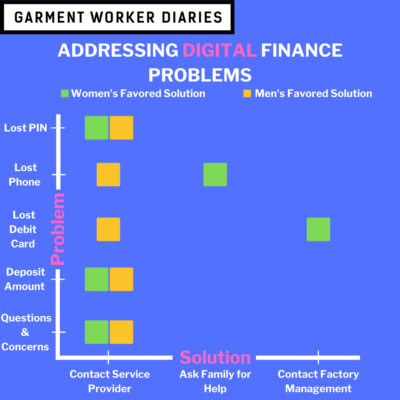Garment workers in Bangladesh are making financial transactions in an increasingly digitized world. The majority of them now receive digital wage payments, meaning they must know how to use, protect and retain PIN numbers, debit cards, phones, and details about their accounts. They must also be able to navigate digital interfaces.
Since managing bank and mobile money accounts presents a unique set of challenges, MFO and SANEM decided to ask garment workers how they deal with the frustration of losing a debit card or forgetting a PIN number. Of the garment workers we interviewed last week, 79% had a mobile money or bank account. Here is how those 79% are solving digital account problems.
Note: Numbers may not sum to 100% due to rounding.
Key Takeaways
Before we present the full data, here are some highlights regarding gender differences and digital problem-solving:
- Women are more likely than men to seek help from their family members or factory management in every problem category about which they were interviewed
- Men are most likely to seek help from their mobile money or bank account service provider and are more likely to do so than women in every single interview category
- Women do prefer to seek help from service providers rather than from their family members or factory management in three of five categories: losing a PIN number, questioning a deposit amount, and getting help for general or other concerns
- Both women and men are more likely to turn to account service providers in the case of questionable deposit amounts than they are to seek help from their factory management, despite most deposits into garment workers’ accounts being digital wage payments
- The least preferred solution to all digital account problems is to call a help line…calling help lines is more favorable than calling the police and seeking other solutions only in the case of a lost mobile phone
Losing a PIN Number
- 57% of respondents said they would either walk to or call their service provider’s office if they lost their PIN number
- 50% of women said they would contact their service provider compared to 75% of men who said the same
- 26% of respondents said they would speak with factory management if they lost their PIN number
- 30% of women said they would speak with factory management compared to 18% of men who said the same
- 12% of respondents said they would go to a family member for help if they lost their PIN number
- 16% of women said they would go to a family member for help compared to 3% of men who said the same
- 4% of respondents said they would seek out a friend or some other solution if they lost their PIN number (with similar proportions for women and men)
- Just 1% of respondents said they would call a help line if they lost their PIN number (with similar proportions for women and men)
Losing a Mobile Phone
- 45% of respondents said they would go to a family member for help if they lost their mobile phone
- 51% of women said they would go to a family member for help compared to 31% of men who said the same
- 23% of respondents said they would either walk to or call their service provider’s office if they lost their mobile phone
- 19% of women said they would contact their service provider compared to 33% of men who said the same
- 16% of respondents said they would speak with factory management if they lost their mobile phone
- 17% of women said they would speak with factory management compared to 11% of men who said the same
- 10% of respondents said they would seek out a friend or some other solution if they lost their mobile phone
- 8% of women said they would seek out a friend or some other solution compared to 15% of men who said the same
- 4% of respondents said they would call a help line if they lost their mobile phone (with similar proportions for women and men)
- 2% of respondents said they would contact the police if they lost their mobile phone (with similar proportions for women and men)
Losing a Debit Card
Of the respondents who have a mobile money or bank account, 57% reported that they do not have a debit card (with 61% of women saying they have no debit card compared to 46% of men). This is the problem-solving breakdown for the remaining respondents who do have a debit card.
- 47% of respondents said they would either walk to or call their service provider’s office if they lost their debit card
- 36% of women said they would contact their service provider compared to 68% of men who said the same
- 38% of respondents said they would speak with factory management if they lost their debit card
- 45% of women said they would speak with factory management compared to 25% of men who said the same
- 11% of respondents said they would go to a family member for help if they lost their debit card
- 15% of women said they would go to a family member for help compared to 3% of men who said the same
- 3% of respondents said they would seek out a friend if they lost their debit card (with similar proportions for women and men)
- Just 1% of respondents said they would call a help line if they lost their debit card (with similar proportions for women and men)
Questions About Deposit Amounts
- 47% of respondents said they would either walk to or call their service provider’s office if they had a question about an amount deposited into their account
- 41% of women said they would contact their service provider compared to 62% of men who said the same
- 23% of respondents said they would go to a family member for help if they had a question about an amount deposited into their account
- 28% of women said they would go to a family member for help compared to 10% of men who said the same
- 20% of respondents said they would speak with factory management if they had a question about an amount deposited into their account
- 21% of women said they would speak with factory management compared to 17% of men who said the same
- 9% of respondents said they would seek out a friend or some other solution if they had a question about an amount deposited into their account (with similar proportions for women and men)
- 1% of respondents said they would call a help line if they had a question about an amount deposited into their account (with similar proportions for women and men)
Other General Questions or Concerns
- 57% of respondents said they would either walk to or call their service provider’s office if they had a general question or concern about their account
- 54% of women said they would contact their service provider compared to 67% of men who said the same
- 17% of respondents said they would go to a family member for help if they had a general question or concern about their account
- 21% of women said they would go to a family member for help compared to 9% of men who said the same
- 16% of respondents said they would speak with factory management if they had a general question or concern about their account
- 18% of women said they would speak with factory management compared to 13% of men who said the same
- 8% of respondents said they would seek out a friend or some other solution if they had a general question or concern about their account (with similar proportions for women and men)
- Again, just about 1% of respondents said they would call a help line if they had a general question or concern about their account (with similar proportions for women and men)
Calls to Service Providers
- 3% of respondents reported they experienced a problem connecting with their account service provider over the phone
- 12% of respondents reported no problems getting through at all
- 85% of respondents said that the question was not applicable to them.
All data presented here come from interviews conducted over the phone with a pool of 1,285 workers. These workers are employed in factories spread across the five main industrial areas of Bangladesh (Chittagong, Dhaka City, Gazipur, Narayanganj, and Savar). Just over three-quarters of the working respondents are women, roughly representative of workers in the sector as a whole.
